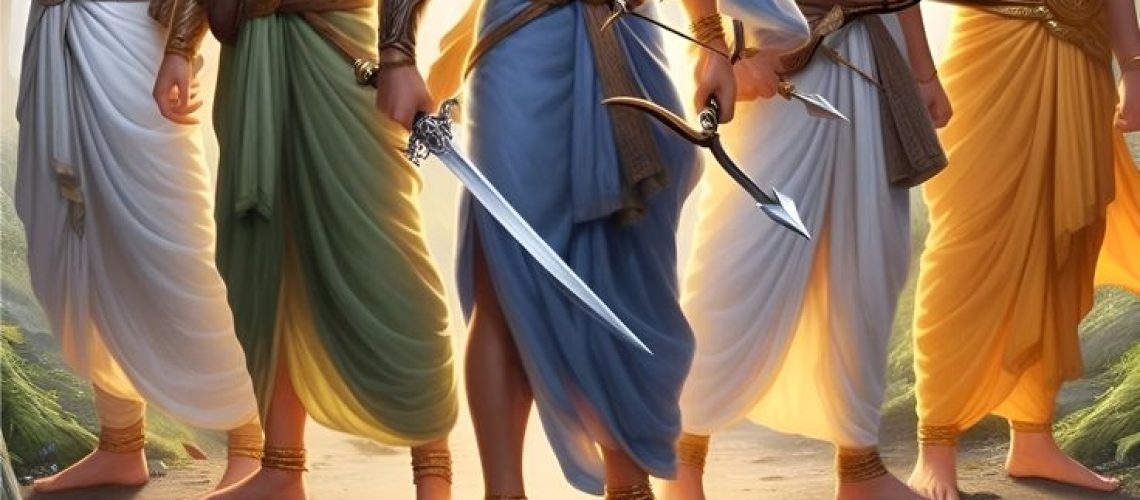At a time when everything is digital, even the Mahabharata has lessons for us that we can learn from. The Pancha Pandavas are the five Pandava brothers who were all known for their own strengths and weaknesses. They are Yudhishthira, Bhima, Arjuna, Nakula and Sahadeva. Each of them had their own unique strength. They all can be used as modern symbols of Digital Safety and Ethics. Like the Pandavas who fought for Dharma against deceit and sight in Mahabharata, today’s digital citizens must get inspired by the integrity, awareness, protection, hygiene, and foresight values to strike back the digital Kauravas. The below comparison of each Pandava with a particular aspect of digital safety enables us to understand how ancient virtues inspire modern vigilance.
Yudhishthira – The Embodiment of Truth and Consent.
- According to me, Apps and websites must reflect Yudhishthira’s virtue by not misleading the unsuspecting user with secret permissions or deceptive terms of use.
- Overview of Personality: He is very honest and dharmic and to top it all wise.
- Like how Yudhishthira did not lie (only once, and that too, reluctantly), the digital users should always speak the truth online by giving informed consent (especially while sharing data).
According to my observation, Apps and websites must reflect Yudhishthira’s virtue by not misleading the unsuspecting user with secret permissions or deceptive terms of use.
Bheema – The Strength and Defender.
- Overview of Personality: Strength embodies loyalty and the protection of the weak.
- Cybersecurity Framework & Protection, the Digital Parallel
- Bheema is the firewall, encryption, and antivirus systems. Also, Bheema stands for secure authentication.
Just like he never hesitated to fight for his brothers, similarly, a digital system with a good guard never hesitates to stop malware, phishing attacks, brute-force hacks, and any other cyber-criminal activity.
Arjuna – Skill, Focus, and Precision
- Overview of Personality: The virtue of this superior archer is disciplined learning to focus on the eye of the bird.
- Digital Parallel: Digital Awareness & Skill Development.
- Arjuna represents digital literacy; the ability to spot an online threat, as well as remaining attentive to the right things and not getting distracted by the fake news or scam links.
Just like Arjuna learned under the guidance of Krishna, users today must learn to develop digital critical thinking under the guidance of ethical monitors or verified sources..
Nakula – Beauty, Cleanliness, and Health
- Overview of Personality: A handsome person, noble in nature, a skilled horseman and a symbol of grooming and mental health.
- Digital Parallel: Digital Hygiene.
- Nakula’s virtues hint at what you must do for safe browsing, routinely update passwords, fix your devices and be neat online.
He reflects the importance of having a healthy digital identity by avoiding toxic content and ensuring mental well-being.
Sahadeva – Knowledge, Intuition, and Strategy.
- Overview of Personality: Wise for his age, astrologer, observer, thinker. Virtue.
- Digital Parallel: Predictive Analytics and Cyber Strategy.
- Sahadeva signifies the translation of intelligence into a conceptual representation that can be adapted into code and offer a schematic solution.
His foresight teaches us to prepare ahead of time by enabling multi-layered cyber risk assessments and being ready for an attack by a zero-day and social engineering attack.
Summary :
The teachings of the Pancha Pandava, each possessing unique strengths and values, can be reinterpreted as timeless values of digital safety and ethics, A digital Himalaya .
- Yudhishthira: Truth & Digital Integrity – Be honest, transparent, and ethical.
- Bheema : Security Systems – Stay protected and vigilant.
- Arjuna: Awareness & Focus – Train to spot and avoid falling to cyber crimes.
- Nakula : Digital Hygiene – Stay clean, safe, and healthy online.
- Sahadeva: Intelligence & Strategy – Plan ahead, observe patterns..
Disclaimer:
The simile is for creative reinterpretation with the intention of drawing a parallel between the old beneficiaries the Pancha Pandav with the new digital safety principles. It is created for only teaching and awareness purposes The material is not aimed at hurting any religious or cultural sentiments. It is the personal understanding of Mahabharata to promote digital ethics and cybersecurity.



